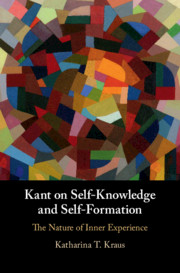Book contents
- Kant on Self-Knowledge and Self-Formation
- Kant on Self-Knowledge and Self-Formation
- Copyright page
- Dedication
- Epigraph
- Contents
- Figures
- Table
- Preface
- Introduction From Inner Experience to the Self-Formation of Psychological Persons
- Part I The Appearing Self
- Part II Self-Consciousness and the “I” of the Understanding
- Part III The Human Person and the Demands of Reason
- 5 The Guiding Thread of Inner Experience
- 6 The Demands of Theoretical Reason and Self-Knowledge
- 7 The Demands of Practical Reason and Self-Formation
- Epilogue Individuality and Wholeness
- Bibliography
- Index
Epilogue - Individuality and Wholeness
from Part III - The Human Person and the Demands of Reason
Published online by Cambridge University Press: 01 December 2020
- Kant on Self-Knowledge and Self-Formation
- Kant on Self-Knowledge and Self-Formation
- Copyright page
- Dedication
- Epigraph
- Contents
- Figures
- Table
- Preface
- Introduction From Inner Experience to the Self-Formation of Psychological Persons
- Part I The Appearing Self
- Part II Self-Consciousness and the “I” of the Understanding
- Part III The Human Person and the Demands of Reason
- 5 The Guiding Thread of Inner Experience
- 6 The Demands of Theoretical Reason and Self-Knowledge
- 7 The Demands of Practical Reason and Self-Formation
- Epilogue Individuality and Wholeness
- Bibliography
- Index
Summary
This book set out to explore what, for Kant, makes us unique individual persons and how we come to know ourselves as such. It has done so by examining levels of representational self-determination and by showing how the bits and pieces of a mental life constitute a unified person. Beginning with the lowest levels of self-affection and inner perception (Chapter 2), it moved to the levels of self-consciousness (Chapter 3), logical self-determination (Chapter 4), and inner experience (Chapter 5), and, finally, arrived at the normative demands that govern both the acquisition of self-knowledge (Chapter 6) and the self-formation as a unified person (Chapter 7). These normative demands are based on the idea of the soul, which has been shown to define the unifying form of a person’s mental life. It is the idea under which we have to conceive of ourselves as persons and the idea that prescribes what it takes to be a person at all.
- Type
- Chapter
- Information
- Kant on Self-Knowledge and Self-FormationThe Nature of Inner Experience, pp. 277 - 279Publisher: Cambridge University PressPrint publication year: 2020
- 1
- Cited by

